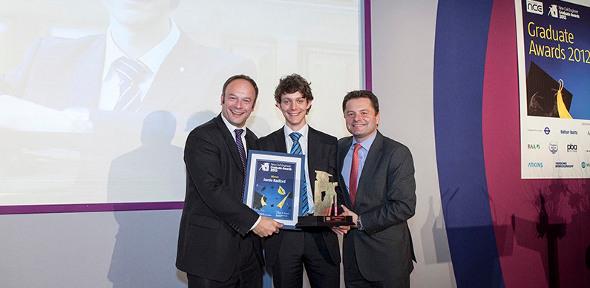
Jamie Radford was named recently as the overall winner in the 2012 New Civil Engineer (NCE) Graduate Awards and is also the runner up of the 2012 Institution of Civil Engineers (ICE) Graduate and Student paper competition.
Civil engineers have a responsibility to change and improve people’s lives.
Jamie Radford
Jamie Radford, who graduated from the Department of Engineering in 2011 and is now working at Mott MacDonald, was named recently as the overall winner in this year's New Civil Engineer Graduate Awards. At the presentation lunch Jamie was handed a cheque for £1,500 and a specifically crafted trophy by the chairman of the Judges.
In addition to being the National Graduate of the Year, Jamie is also the runner up of the 2012 ICE Graduate and Student paper competition. His paper titled 'The characteristics of pit latrine sludge' was based on work he carried out for his final year project, working with the Department's Dr Dick Fenner to develop improved means of emptying pit latrines in dense urban areas in developing countries.
The paper is only part of the reason Jamie beat off 115 worldwide entrants to take the award. He was one of six finalists grilled by a panel of 17 senior directors from sponsoring companies. They were impressed with is experience and knowledge. This includes his term as president of the university's engineering society where he chaired a committee of 14, allocated a £30K budget and voiced the opinions of 1,000 undergraduates to university management boards. He is also credited with organising the largest volunteer-run careers fair in any UK university.
It was as co-president of the Cambridge branch of the student run charity Engineers Without Borders that Jamie gained his exposure to developing countries. A two month trip to El Salvador resulted in the design of a sustainable wood burning stove, which could be built by local inhabitants. He then founded a research initiative into sustainable housing, a project involving 150 undergraduates, a dozen full time research academics and $190K in grants. He is currently seeking charity status for the whole scheme.
A two month expedition to Ecuador saw him identify six previously unknown butterfly species including one now named after him. Towards the end of his time at the Department of Engineering Jamie had notched up three major academic prizes and scholarships. But it is his work on latrine sludge that fires him most.
"We know nothing about the physical strength of faecal sludge and how it behaves while being pumped from village latrine pits," said Jamie. "Thousands of inefficient pumps result in filled-up toilets simply being abandoned leading to serious health hazards and shortages of valuable land for house building."
Since graduating Jamie has continued to develop this work for Water for People by using a new approach to characterising sludge in pit latrines in Kampala, Uganda, to determine the ease with which individual pits can be emptied using various vacuum devices. Details of the method will shortly be published by the International Water Association. He has been central to developing a Mott MacDonald proposal project which aims to develop devices capable of removing and processing faecal waste in a manner compatible with environmentally and socially acceptable standards. With Mott Macdonald's support Jamie has forged a reputation as a world authority on the subject and hopes it will lead to sustainable solutions that will positively benefit communities in the developing world. Also in his work for Mott MacDonald he has assisted with project control, client liaison and financial management of a £270k project for a major UK utilities company and coordinated project work across three remote offices as well as managing the company's quality assurance programme.
Team entries are now invited for the 2013 Competition.

